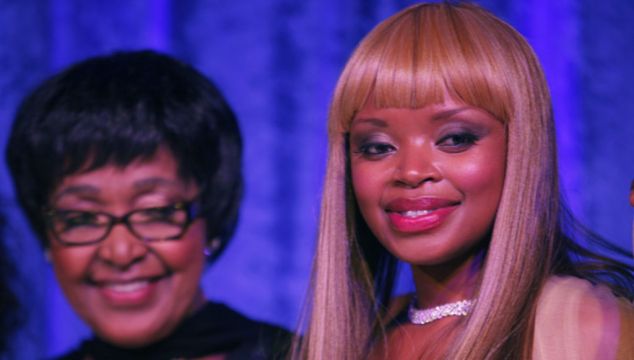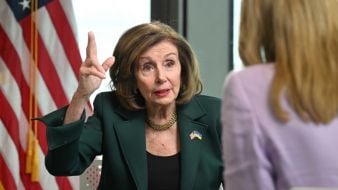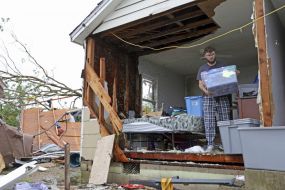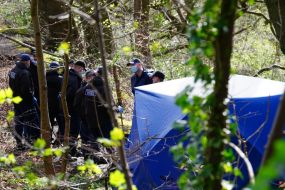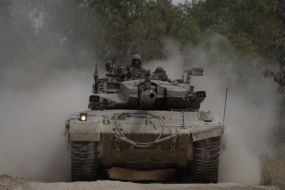Zoleka Mandela, the granddaughter of Nelson Mandela and whose life was tangled up in addiction, a battle with cancer and the tragedy of losing two young children, has died aged 43.
Her death on Monday was announced by the Mandela family in a statement on Tuesday.
The breast cancer she had fought for years had been in remission. But she was later diagnosed with cancer in her liver and lungs and it had metastasised and spread, her family said.
The Nelson Mandela Foundation extends its heartfelt condolences to the Mandela family on the passing of #ZolekaMandela, tragically last night.
We mourn the loss of a beloved grandchild of Mum Winnie and Madiba and a friend of the foundation.
When her inspiring memoir When… pic.twitter.com/irmXI1qZwQ— NelsonMandela (@NelsonMandela) September 26, 2023
Advertisement
The Nelson Mandela Foundation, which promotes the legacy of the South African statesman who died in 2013, said it mourned Zoleka Mandela’s death and offered its condolences to her family.
It said she was a “beloved grandchild” to Nelson Mandela and praised her work raising awareness for cancer and her role as an inspiration to those affected by the disease and to those who had lost children.
She set up foundations to help people in both spheres.
Her early story was a series of struggles and tragedies that were almost too much for one person. They were set against her self-confessed attempt and initial failure to live up to the example of her grandfather, a Nobel Peace Prize winner, the leader of the anti-apartheid movement, the first black president of South Africa and a powerful force for good recognised and admired across the globe.
Ms Mandela suffered sexual abuse as a child and battled drug and alcohol addiction from her teenage years. Her 13-year-old daughter, Zenani, was killed in a car crash in 2010 on the way back from a concert that marked the opening of the World Cup in South Africa.
It was caused by a drunk driver and came when Zoleka, herself, was deep in her drug and alcohol addiction and in a hospital having attempted suicide.
“I hadn’t seen my daughter for 10 days before her passing, and I hadn’t because I chose to use drugs,” Ms Mandela said in an interview with The Associated Press in 2013.
“That’s obviously a reminder that I chose my addiction over my kids and I have to live with that for the rest of my life.”
The horror and guilt jarred her into seeking help and going into rehab for the good of her older son, Zwelami, and the memory of her daughter, she said.
Zenani’s death brought a frail-looking Nelson Mandela out to a church for his great-granddaughter’s funeral and one of his last public appearances.
Having got herself clean, Ms Mandela was diagnosed with breast cancer barely a year after her daughter’s death, leading to a double mastectomy and gruelling chemotherapy.
Her second son was born prematurely in 2011 while she was being treated for cancer and died days later. She had another daughter, Zanyiwe, in 2014.
Ms Mandela released an autobiography titled When Hope Whispers in 2013. It delved into what she called some of the “unbearable circumstances” of her life and how an abnormal childhood played its part.
In the book, she recounted the realities of being a Mandela when South Africa was in some of its most violent throes under the apartheid system of racial segregation in the 1980s and her grandfather was in jail for leading the anti-apartheid movement.
Ms Mandela was smuggled into a high-security prison on an island off Cape Town at the age of one so her grandfather could meet her for the first time, she said in her book.
As a child, she hid a grenade in her schoolbag so her grandmother, who was part of the armed resistance to apartheid, would not be arrested by the regime.
The opening line of her autobiography set the stage for her early childhood: “By the time I was born … my mother knew how to strip and assemble an AK-47 in exactly thirty-eight seconds,” she wrote.
She was abusing alcohol by the time she was nine, and later doing lines of cocaine daily, the start of an addiction that led her, years later, away from her own children and toward the greatest of her regrets when she was an absent parent at the time her daughter was killed.
But her life changed and her story ultimately closed with a different chapter. She became a renowned campaigner, both for cancer awareness and also for road safety, winning praise and admiration for her work in both fields, and for her courage in the latter stages of her terminal cancer.
The foundation that bears her grandfather’s name recognised her as a “tireless activist,” possibly the most fitting tribute given that as daunted as she was by the legacy of Nelson Mandela, she was ultimately inspired by it, and by him.
She once said that, above all, she hoped he approved.
“I just hope where he is with my daughter he is looking down and thinking she has gotten it right, finally,” she told the BBC in 2016.
